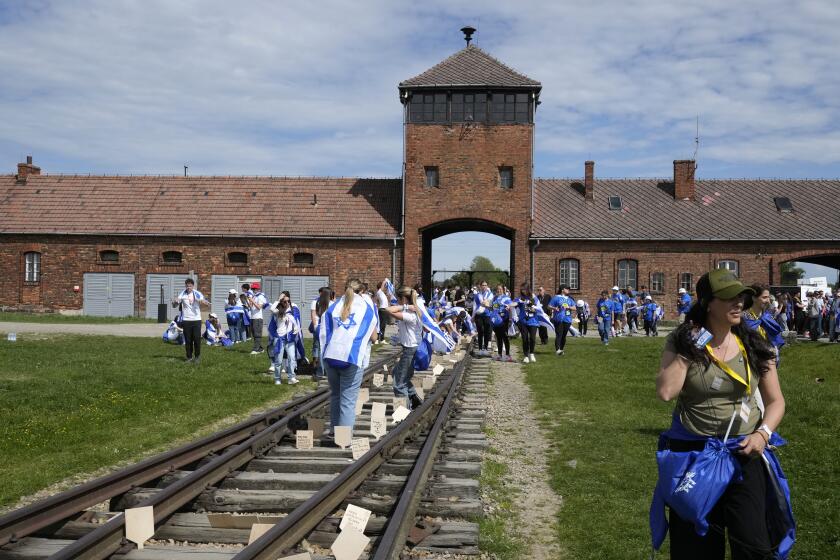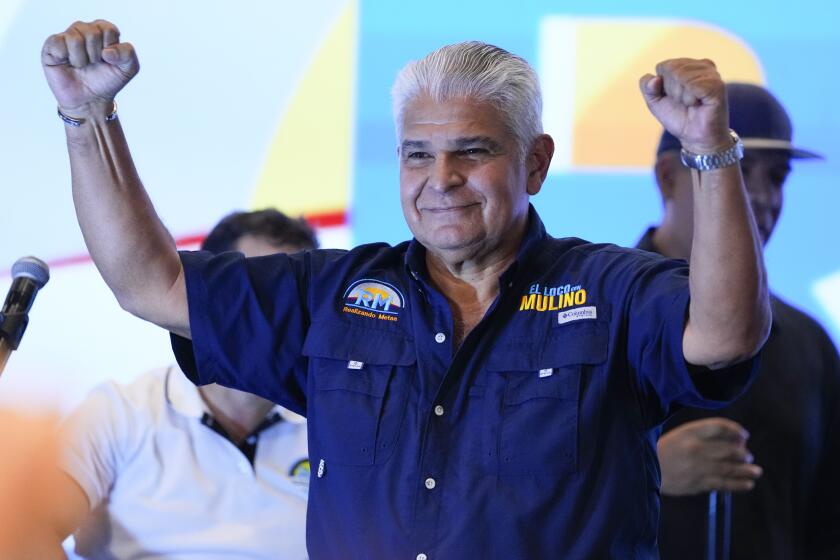Tutu to Defy South African Ban on Observing Soweto Riots Anniversary
Bishop Desmond Tutu, the 1984 Nobel Peace laureate, said Thursday that he will defy a South African government order banning any commemoration of the 10th anniversary of the Soweto riots and will direct his clergy to hold memorial church services.
Condemning the ban as insensitive and provocative, Tutu called on other religious leaders to join him in challenging the government on this issue.
“I will instruct my clergy to organize church services on June 16 and I will certainly participate in such services,” the Anglican prelate declared. “We have not yet reached the stage where we must ask for permission from a secular authority to worship God.”
Further criticism of the sweeping government order came from the South African Council of Churches, the country’s Catholic bishops, multiracial labor unions and a wide range of anti-apartheid organizations.
Warns of Clashes
And the United Democratic Front, many of whose 650 constituent groups have declared their intention to proceed with meetings planned to commemorate what they call the “Soweto uprising,” w1634889317to clashes between police and anti-government demonstrators and probably to a sharp rise in violence.
A nationwide general strike and school boycott are also being planned by blacks to mark the anniversary.
“The South African government should expect to take full responsibility for the obvious confrontation that this completely insensitive act will generate,” the umbrella group of anti-apartheid organizations said, acknowledging the likelihood of a bloody showdown between black militants and security forces.
Law and Order Minister Louis le Grange had invoked South Africa’s severe security laws Wednesday to prohibit “any gathering,” including religious services, to mark the yearlong Soweto riots, which began June 16, 1976.
Extend Through June
Le Grange also banned any meetings marking the June 26, 1955, adoption of the “Freedom Charter,” which sets out the principles for a post-apartheid South Africa and which has become the manifesto of the outlawed African National Congress in its fight against minority white rule here. Both bans run through June 30.
Police, enforcing Le Grange’s orders, prevented the United Democratic Front from holding a planned meeting in downtown Johannesburg at noon Thursday to launch a campaign here for the legalization of the African National Congress. They declared that any meeting related in any way to the African National Congress is now illegal.
About 100 angry black youths then went on a 20-minute rampage, breaking a number of shop windows and stoning passing cars and trucks before being persuaded by their leaders to disperse. Police riot units hurried to the scene but said they made no arrests since the youths were leaving.
Setbacks for Government
The government, increasingly on the defensive as it attempts to halt the continuing civil strife while proceeding with its step-by-step reform program, suffered two more political setbacks Thursday:
--The Colored, or mixed-race, house in the three-chamber Parliament voted to send two pieces of security legislation back to committee for revision. One bill would give the minister of law and order authority to declare any district an “unrest area” and then to take whatever actions he believed necessary to restore order; the other would permit the police to detain without charge for six months anyone they believe might have been involved, or might become involved, in the continuing civil strife.
--In Pietermaritzburg, Justice John Milne ruled in the Natal Provincial Supreme Court that all the video and audio tape recordings that the prosecution planned to introduce in the treason trial of four black union leaders are inadmissible because the state cannot prove they had not been tampered with, and some clearly had been. The case against the union leaders may collapse now, just as related charges against United Democratic Front officials fell apart six months ago.
Meanwhile, a black policeman was shot and killed early Thursday, according to police, while attempting to arrest a mob looting a liquor store in Soweto, the black satellite city outside Joh1634627173blasts, part of a fusillade that kept police at bay while the looters escaped. Police threw hand grenades into the store to silence the gunfire from it, but found no one inside.
Burned as Informer
A black man was killed by police near Port Elizabeth when a police patrol used shotguns to disperse a crowd of about 100 blacks trying to kill a woman, apparently as a suspected police informer, by dousing her with gasoline and setting her afire. She survived but suffered serious burns over most of her body, police said.
Tutu, the Anglican bishop of Johannesburg, said that Le Grange, in prohibiting any meetings to commemorate those killed in the 1976 riots, “seems bent on provoking blacks to defy his ill-advised ban to give policemen yet another excuse to get at black people.”
South Africa’s Catholic bishops said that if he does not want blood on his hands, Le Grange should “do the honored and Christian thing and withdraw the ban.”
“This ban is a recipe for disaster, particularly if a confrontation develops between security forces and the people,” they warned.
Even Chief Mangosuthu Gatsha Buthelezi, the Zulu leader who is locked in a bitter struggle for political influence with the African National Congress, the United Democratic Front and their allies, said that the Soweto anniversary must be observed by blacks, though without “an extravagance of violence and death.”
Employers’ groups are advising their member firms to adopt a “no work, no pay, no penalty” policy that would allow black workers to stay home Monday, June 16, the day of the planned general strike, with only the loss of a day’s pay.
But the country’s largest company, Anglo American Corp. Ltd., a mining and industrial conglomerate, has said it will go further and close its headquarters and other offices at noon as a mark of respect. Another leading firm, Premier Group Holdings Ltd., has declared the day a paid holiday.
‘This ban is a recipe for disaster,’ Catholic bishops warned.
More to Read
Start your day right
Sign up for Essential California for news, features and recommendations from the L.A. Times and beyond in your inbox six days a week.
You may occasionally receive promotional content from the Los Angeles Times.






